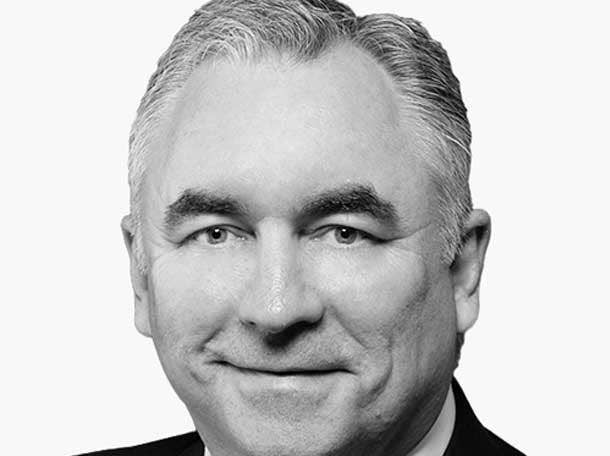8 Big Bets To Watch From New Optiv CEO Kevin Lynch
From investing in underpenetrated segments and verticals to pursuing strategic outsourcing opportunities, here’s a look at the key investments former Deloitte leader Kevin Lynch plans to make as Optiv’s new CEO.

Big Shoes To Fill
Longtime Deloitte leader Kevin Lynch will start Friday as Optiv’s second-ever CEO, replacing Dan Burns, who co-founded Accuvant in 2002 and helped architect the 2015 merger between Accuvant and FishNet that created the world’s largest pure-play security solution provider. Burns will stay on as an executive advisor to the CEO, partnering with Lynch and the board to ensure a smooth transition.
Lynch takes over as Denver-based Optiv, No. 27 on the 2019 CRN Solution Provider 500, has evolved its business beyond provisioning and reselling security technology to deliver advisory, configuration, implementation and managed services. But Optiv’s transformation into a security systems integrator has created points of friction that could slow the field sales team down as the company continues to grow.
“At the end of the day, Optiv’s mission is really valuable to me,” Lynch told CRN in an interview Monday. “And that part is incredibly exciting to me.”
From investing in underpenetrated market segments and verticals to pursuing strategic outsourcing engagements to streamlining and prioritizing corporate initiatives, here’s a look at eight of the biggest bets Lynch plans to make as Optiv’s new CEO.

8. War For Brand Dominance In Security Market Hasn’t Been Won Yet
Optiv is operating in a market that has experienced a blistering pace of innovation and threats over the past half-decade yet remains relatively unstructured with no clear brand leader, Lynch said. Optiv has earned the trust and backing of CISOs and CIOs to take on threats, but Lynch said the company isn’t as well known as it should be in the executive suite or boardroom where risk discussions are taking place.
Optiv has all the right pieces to win the war for brand dominance thanks to its partner relationships, technical chops, unbelievable talent, and proximity to its customers, according to Lynch. As Optiv systemizes its ability to support customers on their digital journey, Lynch said the company can build a platform over the next two-to-five years that becomes the brand standard for the entire industry.
“I love the notion of an unstructured market with great growth dynamics and a war for brand dominance that hasn’t been won yet,” Lynch said. “I look at Optiv as a platform and I think we have all the right pieces.”

7. Virtual Meetings, Contingency Plans Come Into Focus With Coronavirus
If Lynch was taking over as CEO under normal conditions, he would be spending much of his first several weeks on airplanes getting in front of Optiv’s largest customers, most valuable vendor partners and employees around the world to help key stakeholders understand who he is and what he’s about. But given the coronavirus pandemic, face-to-face interactions aren’t feasible for the foreseeable future.
Instead, Lynch and outgoing CEO Dan Burns will attempt to interact virtually with key customers and vendor partners over the next few weeks. In addition, Lynch said he plans to work on COVID-19 contingency plans with the Optiv team that account for different scenarios so that the company can most effectively manage its way through the situation.
“These are brand moments. These are moments that actually will make a difference for clients,” Lynch said. “They will remember who was there for them at this point and time, because it's a very difficult time not just for us but for everybody.”

6. Fuse Technology Resale, Services Together For Better Outcomes
Optiv has brought strong processes, coverage and client relationships to the table around its technology value-added reseller business since the company was formed in 2015, and has in recent years built a services capability that’s also incredibly strong, Lynch said.
But getting the technology resale and services businesses to effectively intersect has been a journey when it comes to stability, consistency and reliability, Lynch said. As that integration becomes more effective, Lynch said Optiv will be able to more easily ingest all kinds of opportunities from the simple and straightforward to the very complex and bespoke.
“Optiv’s brand won’t come from Super Bowl ads,” Lynch said. “It'll come reputationally from the work that we do to add value for our clients, whether that’s measured in terms of risk avoidance or building the capabilities that allow their customers or owners to have confidence in their secure infrastructure.”

5. Streamline Internal Processes To Remove Friction As Optiv Scales
In the early days, Lynch said Optiv scaled the intersection of its services capability and technology provisioning through brute force, which yielded results as far as attach rates were concerned. But as the opportunities for Optiv grow ever more frequent, Lynch said the company needs to make sure that its field sales force isn’t hindered by an operational infrastructure or processes that slow them down.
As Optiv has scaled, Lynch said the company has run into points of friction in terms of ensuring that its enablement activities don’t slow the engagement cycle or deployment of talent down. There’s more friction in Optiv’s internal processes today than there needs to be, according to Lynch.
As time progresses, Lynch said Optiv also has the opportunity to take stronger positions around safety and security, talent development, succession and diversity. A deeper embrace of diversity should help make Optiv more noteworthy and relevant in certain brand environments, according to Lynch.

4. Financial, Strategic Initiatives Vital In Board’s Assessment Of Lynch
Lynch said Optiv’s board of directors will hold him to the same financial and economic productivity expectations that were ratified by outgoing CEO Dan Burns on Jan. 1. The board also expects Lynch to progress a series of corporate initiatives in areas such as penetrating certain markets, growing Optiv’s footprint with vendor partners, and strengthening key relationships, he said.
Lynch said he’ll be expected to hit certain benchmarks around market penetration and the depth of Optiv’s most significant relationships. Whether Optiv is advising, configuring, implementing or operating technology for its partners and customers, Lynch said the board is going to hold him accountable to the same vision that was laid out by Burns.
“This is about us taking a more pertinent and central role with our partners and our customers,” Lynch said. “We want Optiv to be the brand leader to support our clients in this space.”

3. Reduce And Prioritize The Volume Of Corporate Initiatives
The number of corporate initiatives Optiv has today is nearly in the triple-digits, and Lynch said he’d like the company to streamline and prioritize these activities so that a few can be complete each quarter. Instead of plodding along slowly with dozens of different initiatives, Lynch plans to have Optiv think in terms of quarterly sprints so that outcomes are achieved on key corporate priorities within 90 days.
“I think we have a lot of initiatives to scale and improve the business all at once,” Lynch said. “And I think we're probably making progress on all but not enough on a few. And so you'll probably see a degree of reprioritization.”
Lynch hopes these initiative sprints can take place over and above employees’ regular work rather than becoming a full-time responsibility for certain employees. Over time, Lynch hopes to get Optiv culturally set up to continuously optimize how the company sells, services, delivers and accounts for its work without impeding on employees standard responsibilities.

2. Pursue Strategic Outsourcing Engagements Around High-Value Tasks
Optiv has the opportunity to build some real capability and grit around the strategic outsourcing of certain security activities such as DevOps and Security Operations Centers (SOCs), Lynch said. This is very different that outsourcing core ERP, network or infrastructure operations, Lynch said, and requires the end user to trust that Optiv can operate efficiently and effectively at scale as part of their ecosystem.
“I view this really differently than outsourcing the help desk for basic IT issues,” Lynch said. “This is a trusted participant inside the firewall. It requires a really different brand.”
Being a good ecosystem partner requires strengthening trust and resilience with the customer by increasing scale in the field as well as bringing more pre-configured and configured capabilities that are unique applied to the client’s vertical or situation, Lynch said. CIOs are most interested in differentiated capabilities than efficiency when determining which ecosystem partners to work with, Lynch said.

1. Go After Underpenetrated Market Segments, Industry Verticals
As powerful as Optiv has been, Lynch said the company is underpenetrated in both broad market segments as well as certain industry verticals. In these areas, Lynch said Optiv has less strength and depth, less preconfigured views and less unique architectures as the company does in other spaces where the market fundamentals are equally attractive.
There are certain markets that Optiv plays in today that represent just 3 percent of overall revenue, but Lynch believes should be delivering closer to 20 percent of the company’s total sales. Over the next 12 to 18 months, Lynch expects Optiv to expand what it’s doing in those underpenetrated market spaces as well as grow into markets that the company isn’t serving today.
“I'm going to want to see us take a good hard look at many of the markets that we serve and go aggressively after some spaces,” Lynch said. “I see those as this white and green space where we can get deeper, make a bigger difference, and be a bigger player.”